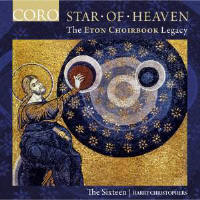Texte paru dans: / Appeared in: |
|
|
Outil de traduction ~ (Très approximatif) |
|
|
Reviewer: J.
F. Weber This is another entry in Harry Christophers’s traversal of the Eton Choirbook, but there are two differences. Three of the four Eton works have already appeared in the first five volumes on Coro, and this is the first disc to include contemporary music, mostly set to Eton texts. All four Eton works were newly recorded last year: his fourth recording of Ave Maria, Mater Dei, and his third recording of Nesciens mater (preceded again by the chant version), Stella caeli, and Wylkynson’s Salve Regina (he has not recorded that composer’s five-voice setting). It may be noted that all four are slightly faster than the previous versions (of which only Nesciens mater was not on the Coro label). If I read the notes correctly, the five contemporary works were all commissioned by the Genesis Foundation for The Sixteen; only the piece by Stephen Hough (b. 1961) among them is not based on an Eton text. Hough’s work employs texts from the Old Testament, eighth-century China, the Navajo, and St. Matthew’s Gospel to go along with the British Museum’s exhibit Living with gods. The Sixteen first performed it in the Parthenon Gallery where the Elgin marbles are displayed around the interior walls, where they exactly invert the layout of the marbles on the exterior walls of the Parthenon. I didn’t expect to appreciate the contemporary works that are mingled with the ethereal 15th-century music, but the Nesciens mater of Joseph Phibbs (b. 1974) matches the mood of Lambe’s setting remarkably well. The same could be said of the Ave Maria, mater Dei of Phillip Cooke (b. 1980), a longer setting than Cornysh’s. I looked for a more contemporary sense from the younger Marco Galvani (b. 1994) in his setting of Stella caeli, but his music fits into the program very well, softening his expression as the text comes to the appeal for deliverance from the plague, addressed to Jesus through the intercession of his mother. The work by James MacMillan (b. 1959) is the longest of the five, based on a six-bar fragment of music found in the Eton Choirbook. His sacred music is voluminous, and Christophers has recorded it before, two discs reviewed in 33:1, another in 35:4, and the masterly Stabat Mater, reviewed twice in 41:1. This newest addition to a highly praised series of compositions is on the same high level. Hough’s work was premiered shortly before the recording was made, a very accessible setting of varied texts that Christophers wanted to add to the program as a conclusion. Forty-seven of the 64 works in the Eton Choirbook have been recorded, 21 of them on his Coro label. Christophers could just as well have duplicated some of the 26 selections that others have recorded, not to mention the remaining 19 works that may or may not be performable in their present state. While I have found Stephen Darlington’s five discs of Eton music admirable, I would not want to discourage anyone from appreciating Harry Christophers’s way with this music. | |
|
|
|
|
Cliquez l'un ou l'autre
bouton pour découvrir bien d'autres critiques de CD |
|




